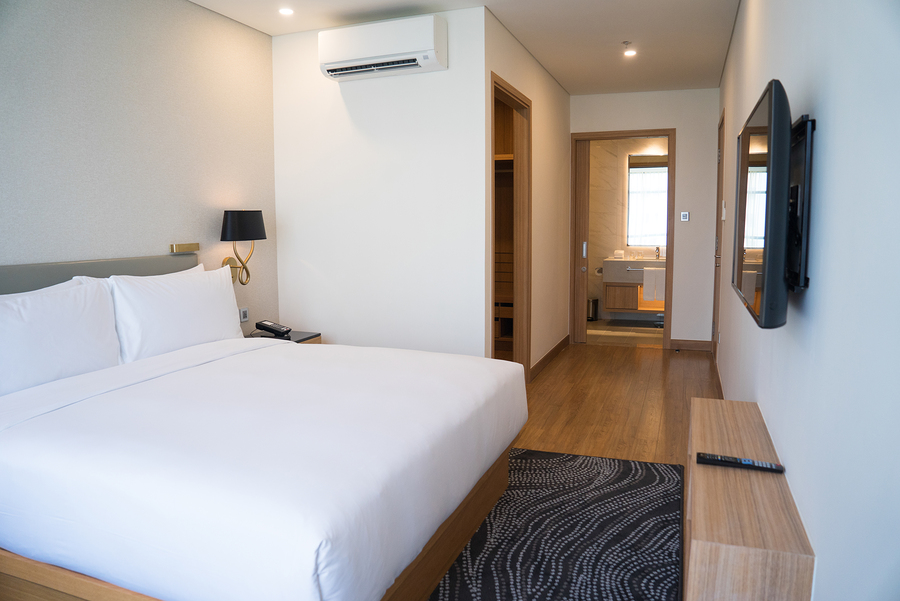
As a dedicated sustainable traveler, I’m thrilled to see that eco-friendly tourism is trending. Without ethical tourism, future generations won’t have the chance to explore our planet’s many diverse cultures, cuisines, and landscapes due to the effects of climate change and overtourism. Travelers can be more conscious of their impact as they explore the globe by staying in genuinely eco-friendly accommodations.
In my travels, I’ve noticed many hotels have jumped on board the eco-friendly bandwagon. Some are genuinely sustainable places that are meeting the demand for eco-conscious initiatives, but others are “greenwashing” and aren’t as environmentally-friendly as they appear to be. Greenwashing is the promotion of programs that falsely claim to reduce carbon emissions, but aren’t actually limiting waste or preserving the environment.
I recently experienced greenwashing in Vietnam when I stayed at a tented camp that I found on Glamping Hub. I was so disappointed when I showed up and saw that they used plastic and styrofoam. I stayed in another hotel in Vietnam that had “ecolodge” in its name that used a dreadful amount of single-use plastic.
I frequently come across hotels asking guests to join them in saving the planet by reusing towels. Efforts like these only skim the surface of sustainability. I’ve noticed that these same hotels use plastic laundry bags, trash can liners, and single-use plastic toiletries.
Greenwashing is minimally regulated, so determining whether a hotel is actually eco-friendly is mostly up to the traveler. Here are five tips I use to avoiding a greenwashed hotel while on vacation.
Be a savvy consumer
Avoid the “eco-friendly” hype by being aware of buzzwords. Look for green slogans that don’t provide any information on how the eco-programs are applied. Genuinely eco-conscious accommodations likely promote detailed information on their websites about their sustainability efforts such as food waste initiatives, efficient electricity and heating solutions. If you do some research and are still wondering, ask before you book.
Look for their accreditation
Check to see if the property is accredited by EarthCheck, LEED, or B Corp, which means they’ve passed rigorous protocols such as Intrepid, which is a leader in sustainable group tourism. In Costa Rica, I stayed at a resort with sustainable certification, but they used plastic straws, coffee cups with plastic lids, fruit in plastic containers, plastic water bottles, and plastic toiletries. Do your own research in order to avoid places that may have accreditation but still aren’t all that eco-friendly by reading guest reviews and asking questions about green policies. And keep in mind that some eco-friendly homestays or guesthouses may not have the funds for these certifications, but are implementing their own sustainable practices.
Book through a certified platform
Find the best places to book by navigating green accommodations on certified platforms. I like to check if the properties I’m interested in are listed on Ecobnb or Book Greener. Booking.com created Book Different so that travelers can select from 7,000+ accommodations that have been certified from credible agencies such as the Green Lodging Program or Green Globe. Using sites like these provides an added layer of checks and balances in your search for greener accommodations.
Learn from the genuinely sustainable places where you stay
The most legitimately eco-restorative and purpose-driven place I’ve stayed is Rancho Margot in Costa Rica. The farm stay is rooted in green business practices. All aspects of their operations are eco-friendly from sustainable farming methods, on-site hydroelectric energy generators, living gardens on roofs that naturally control room temperatures, and virtually zero plastic consumption as nearly everything is made on-site, including furniture and soap! At Bali Eco Stay in Indonesia, I learned that they use wastewater to nourish the gardens that surrounded my eco-friendly bungalow and implemented a rubbish clean-up program with neighboring villages. Make note of sustainable practices on your travels, such as how these properties taught me about waste management and green energy, and then look for them in every new destination.
Sometimes, no matter how much research you do, you won’t be able to determine whether a hotel is greenwashing until you arrive. There’s no perfect system for finding a truly sustainable place to stay, but following these tips will make it much easier.
Originally published February 7, 2019.